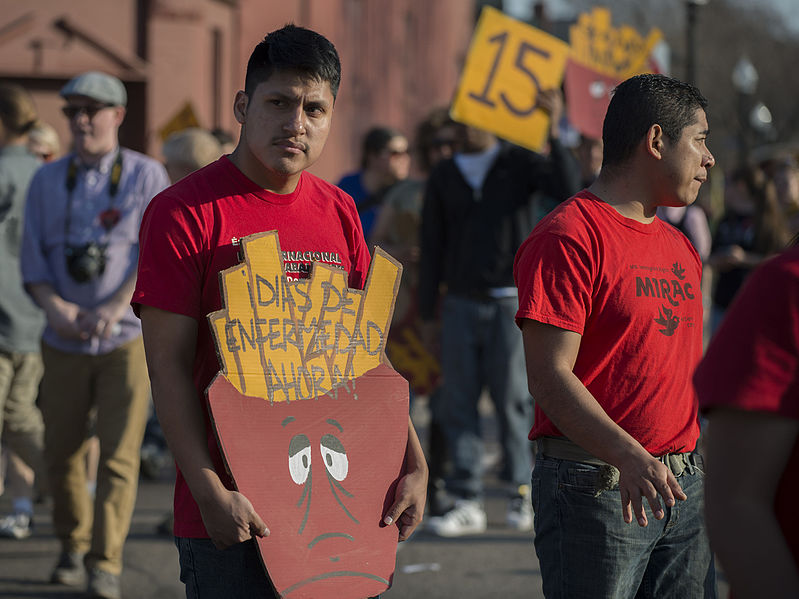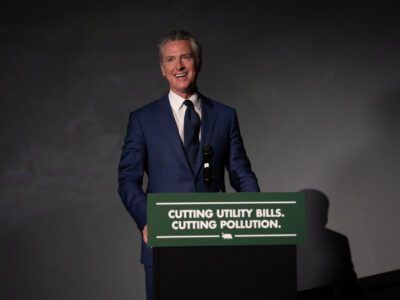A New Battleground in Big Oil’s War on Drilling Setbacks
Big Oil’s referendum on setbacks is the latest in a line of questionable signature-gathering campaigns. Would a new bill reform California’s referendum process?

Earlier this month, my colleague Beth Kent wrote a thorough overview of the referendum seeking to reverse SB 1137, a bill passed by the California Legislature establishing a 3,200-foot setback between new oil and gas wells and sensitive receptors, including homes, schools, and hospitals. That referendum (Ballot Measure 22-0006) will appear on the November 2024 ballot. While Californians patiently wait until then to cast their votes, SB 1137’s critical setback provisions are suspended.
But as Beth noted, Big Oil’s well-funded signature-gathering campaign has been tainted amid reports of petition circulators telling ‘blatant lies’ to secure signatures. These alleged lies range from the spurious claim that the petition exists “to lower gas prices,” to the outright false assertion that the referendum would prohibit neighborhood oil and gas operations (probably a successful strategy, considering Californians’ overwhelming support for buffer zones between residences and oil extraction sites).
On the claim that the petition would merely lower gas prices, there’s evidence that this is a formal talking point developed and encouraged by at least some of the referendum’s financial backers. A now-closed job posting solicited “energetic and conscientious” people to collect signatures supporting a referendum “to help reduce gas prices and prevent prices from increasing to $10/gallon.” There’s some irony there, considering this week’s special session proposal to hold Big Oil accountable for price gouging over the last year.
Other misleading statements can be attributed directly to the California Independent Petroleum Association (CIPA), the oil industry trade association that sponsored the legislation. In a press release, CIPA lobbyists claimed that SB 1137 “instituted a statewide 3,200-foot oil well setback without any scientific basis.” This claim, unsurprisingly, is incorrect. A group of researchers composing the California Oil and Gas Public Health Rulemaking Scientific Advisory Panel concluded that “studies consistently demonstrate evidence of harm at distances less than 1 km, and some studies also show evidence of harm linked to [oil and gas development] activity at distances greater than 1 km.” (One kilometer clocks in at 3,280 feet).
Of course, Big Oil’s resistance to new setback rules, safety regulations, and climate goals is neither new nor unexpected. The industry has aggressively litigated local prohibitions on oil and gas activities––as well as local setback requirements––under a wide variety of theories, including takings, preemption, CEQA, estoppel, state planning law, and so on. And while this referendum is simply another tool in the industry’s toolbox, the use of the ballot measure here feels particularly flagrant. That’s because it represents the capture of a system explicitly designed to put power back into the hands of the people, and away from special interests.
As Beth mentioned in her post, this $20 million ballot measure conjures shades of the American Progressive Bag Alliance (now the American Recyclable Plastic Bag Alliance), an association of plastic industry members that paid $3.2 million to buy their way onto the California ballot in 2016 in an attempt to veto a statewide plastic bag ban.
But it also conjures shades of the $7 million that Working Families for Jobs and Energy Independence (aka Chevron, Aera Energy, and CIPA) spent to block a local measure enacting setback and health protections in Ventura County earlier in 2022.
And the $10 million that Save Local Restaurants (the International Franchise Association) raised to challenge AB 257, which would have raised wages for fast food workers.

And the $23 million that tobacco companies and trade associations spent to try to overturn SB 793, which banned the sale of flavored tobacco products.
The recent parade of industry trade organizations funding signature-collecting “bounty hunters” has drawn the attention of “labor unions, government watchdogs, and environmental advocates.” These advocates argue that industry referendums subvert the direct democracy process––largely born out of progressive-era reforms––and serve the very interests that referendums were meant to protect against. Indeed, recent referendums have made clear that money is a necessary precondition for access to the electoral ballot. Or, to go a step further, recent referendums have made clear that money alone can buy access to the ballot, even in the absence of a popular platform. Numerous articles catalogue instances of paid-per-signature petition circulators (many of whom travel here from out-of-state) duping trusting voters with misleading claims or outright lies.
In a bid to combat this abuse of the referendum process, Assemblymember Isaac Bryan announced a new bill this week, AB 421, that would reform California’s referendum law by increasing transparency and establishing new government oversight mechanisms. The bill would require signature gatherers to register with the California Secretary of State, wear a badge displaying their name, photograph, and an identification number, and attend a mandatory training program. AB 421 would also require referendum petitions to prominently display the top three funders of the referendum campaign on the petition’s first page, ostensibly to offset the slew of pithy-yet-uninformative coalition names that attach themselves to these petitions. Finally, the bill would require 10 percent of petition signatures to be obtained by unpaid volunteers, hopefully meaning that successful ballot measures will have at least some grassroots support. Could the California Independent Petroleum Association really find enough volunteers––volunteers who feel passionately about drilling new oil and gas wells close to hospitals, schools, and homes––to stand outside of grocery stores for hours on end gathering signatures without paying them?
It remains to be seen whether the bill will go anywhere. Former Governor Jerry Brown twice vetoed legislation that would have prohibited payment of signature gatherers on a per-signature basis. Despite calling Big Oil’s ballot referendum “another push to continue harmful drilling near daycares and schools and our homes,” Governor Newsom vetoed a similar bill that would have banned pay-per-signature compensation in 2021.
Regardless, even if the voters defeat the referendum in November 2024, Big Oil has already bought itself nearly two years of applying for––and probably receiving––long-term oil and gas permits within the proposed setback radius. The neighborhood drilling operations that the state permits between now and then are likely to continue poisoning communities for many years, and the referendum has undermined the work of numerous grassroots organizers, frontline communities, and environmental justice organizations.
As a final note, there may be another path forward while we wait for November 2024. In a recent CalMatters article, Center for Biological Diversity attorney Hollin Kretzmann noted that if Governor Newsom is serious about instituting the statewide setback requirement, he could conceivably push the California Geological Energy Management Division (CalGEM) to resume its own previous setback rulemaking, which has been on pause for more than a year. CalGEM has “long faced criticism that it was too cozy with the industry it regulated.” While a legislative approach to a setback requirement would be preferable for a host of reasons, Governor Newsom could conceivably take executive action now to protect the health and welfare of California’s most vulnerable communities. The timing might be right for this; Uduak-Joe Ntuk, CalGEM’s embattled supervisor (and former Chevron engineer), recently stepped down as leader of the agency. Ntuk’s resignation came following a spike in CalGEM’s issuance of oil and gas permit approvals. Newsom has not yet selected a permanent replacement for Ntuk, and the appointment process may serve as an opportunity to secure a new supervisor that will stand up to industry pressure.
Reader Comments
4 Replies to “A New Battleground in Big Oil’s War on Drilling Setbacks”
Comments are closed.







So, I am against us continuing to poison ourselves and the planet, and I am also against this bill. (Though the part about listing the sponsors may have some merit.) It sounds like just more kludge, when what we need are informed voters.
I never listen to what signature gatherers tell me. If I have time I read the form, and if I don’t have time, I don’t sign. Usually they have several petitions with them, so I don’t expect them to know much about any form. They are just trying to eat and pay rent.
I wonder if we don’t lose sight of the big picture too often in these battles. Fe, I wasn’t all that convinced that Exide was the only lead polluter in the area, and now I read that we export a lot of our old batteries to Mexico, so people can be poisoned there instead of here.
Is this really an improvement? Why, if we can get to the moon, can’t we figure out a clean way to recycle batteries, for goodness sake?
And who decided to put housing next to an oil field anyway? (I think maybe the entire Southland might be a potential oil field though, so, I’m being facetious I guess.) As we phase out oil use, maybe some great technologies still exist to be discovered, to protect people. Things we might need in the future. I mean, I’m not against buffers per se, it’s just, this place is a mess from a planning viewpoint. I don’t see a quick fix for that.
Thanks for your comment! While having more informed voters would probably be preferable to banning pay-per-signature altogether, most voters just don’t have time to stay apprised of every veto referendum and tend to trust that petition circulators wouldn’t outright lie for signatures. At the very least, ensuring that a certain percent of signatures are from people who actually believe in the petition would guarantee some degree of grassroots support. The biggest problem here is that getting a veto referendum on the ballot takes relatively few signatures (5 percent of the votes cast for governor) and can delay legislation for up to two years, even where there’s very little popular support.
Your point about leakage is well-taken, but that’s a very nuanced conversation that’s probably not worth getting into here. While it’s a real concern, there’s evidence to show that regulating within jurisdictional boundaries does have a real impact on demand for the regulated product and adoption of better control technologies (because of price increases from greater regulation). So, to your point on figuring out a cleaner way to recycle batteries, higher lead ambient air standards and better enforcement have led to battery recycling facilities adopting new technologies. As more facilities adopt better control technologies, compliance costs tend to decrease.
Of course, these regulations have still led to leakage, although this is partially due to the illegal export of used lead batteries to places like Mexico and China, which the US could do more to crack down on. And while people in other countries are still continuing being poisoned unjustly, better domestic regulations also demonstrate to other nations that control technologies are technologically and economically feasible. Here is a report addressing the severity of the leakage problem with regard to imports of lead batteries to Mexico, while acknowledging the above: https://www.ohchr.org/sites/default/files/Documents/Issues/ToxicWaste/RightToInformation/OccupationalKnowledgeInternational2.pdf.
Oil and gas developers also love the leakage argument: “if we regulate more here, California will just import more crude from countries with lax regulations and human rights abuses.” This argument first assumes that greater regulation of domestic production would have no impact on demand for oil and gas, adoption of ZEVs, or average VMT. But there are reports demonstrating that domestic supply regulation will reduce demand: https://www.nordregio.org/wp-content/uploads/2018/10/Supply-side-climate-policy-in-Norway_Holtsmark.pdf
I’ll also point out that because it’s heavier, California’s oil has a higher carbon intensity than fuels from most other jurisdictions and emits more toxic contaminants like heavy metals and sulfur. But mostly, at the end of the day, it can be defeatist to avoid regulating on the premise that it may make the problem worse in other jurisdictions. Each jurisdiction is responsible for the health and welfare of its people, and they should do what they can to preserve it.
On your point about putting housing near drilling: most of the time the neighborhoods (mostly communities of color) were there before the oil and gas operations started. And even where that’s not the case, exclusionary zoning, racial covenants, redlining, etc. explicitly limited where people of color could live in Los Angeles, and co-located polluting uses in these neighborhoods. Although drill sites disproportionately impact people of color and low-income communities, there are also plenty of permits that have been issued for oil and gas development in more affluent areas (including the Tower of Hope at Beverly Hills High School), they’re just better disguised.
Well, I can’t prove it, but it hasn’t been my impression that the housing came before the industry. At least in LA, I am not at all sure that that is correct. We’ve had these dirty industries for some 100 years or so. The mass of the population arrived a lot later.
And while you make many good points, I would rather see us simply find a way to make these processes clean. I think there should be a way to do that. People aren’t going to stop using batteries – and since as a whole, this is a rich country, I think it should be our burden to figure out how to do that. We spend gobs on money on military hardware and other things we won’t ever use (we hope). This is not the place for us to get cheap.
And I’m not even sure that “regulating” is the way to get there – I mean, we’ve got all these smart people running around at Caltech and in Claremont. Am I supposed to believe that clean recycling is somehow impossible? Such that all we can do is make it expensive for companies and hope they figure it out? I care whether an argument is sound or not – not who makes it.
Still, I do very much agree – let’s stop poisoning ourselves and others! Hurrah.
Oh, and also – my other issue with the petition proposal is that I do not trust the legislature to be sensible – not at all! As it is, we may get strange things on the ballot – but I would rather live with that than make it tougher to put things on there. It is very tough already. I feel like there are too many shenanigans. I don’t want those people interfering with the process any more than necessary.
And who is going to actually check that the gatherers are “volunteers?” I am a liberal but this is clearly aimed at corporations. I don’t think it is yet the case that unions are too strong here, but I could imagine it happening.
Let’s just make people better-informed.